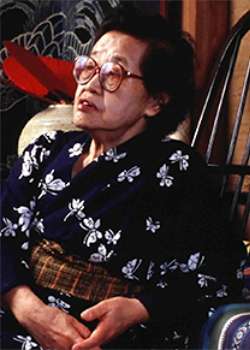Sumie Tanaka
Sumie Tanaka (田中澄江; April 11, 1908—March 1, 2000) was a Japanese screenwriter and playwright born in Tokyo.[1] She was most well known for her long collaboration with film director Mikio Naruse and for writing screenplays for Japan's first major female director Kinuyo Tanaka. Member of the Bungakuza theatre company, she was married to playwright and dramatist Chikao Tanaka. The screenplays she wrote for Repast (めし, Meshi; 1951), Home Sweet Home (我が家は楽し , Wa ga ya wa tanoshi; 1951), and Record of Youth (少年期 , Shonenki; 1951) won her the Blue Ribbon Award for Best Screenplay in 1951.
Sumie Tanaka | |
|---|---|
 | |
| Occupation | playwright, screenwriter, essayist |
| Language | Japanese |
| Nationality | Japanese |
| Notable works | Repast Home Sweet Home Record of Youth |
| Notable awards | Blue Ribbon Award 1951 Best Screenplay – screenwriter |
| Years active | 1930-1984 |
| Spouse | Chikao Tanaka |
Personal life
In 1934, before World War II, Sumie Tanaka married her fellow playwright and dramatist Chikao Tanaka[2] with whom she wrote plays for the Bungakuza theatre company. After the war was over, Sumie Tanaka and her family were baptized into Catholicism, an event that continued to strongly influence her works from then on.[3] It is after World War II that she began her work as a screenwriter.
Career
Sumie Tanaka worked as a playwright and dramatist for the Bungakuza theatre company, a theatre that staged Shingeki. She wrote popular drama and enjoyed a higher reputation than that of her husband's, Chikao Tanaka[4] who directed her first multi-act play, Spring, Autumn (Haru, aki, 1939). She got her start at the Kidō stage and participated in the playwright workshops run by Kunio Kishida and Kan Kikuchi. In her works, Sumie Tanaka often depicted the life of middle-class families based on her own experience of it. These one-act plays include: A Shimmering (Kagero, 1934), Akiko's Face (Akiko no kao, 1936), and The Bereaved Family (Izokutachi, 1937).[5]
Sumie Tanaka also wrote several plays for the actress Yaeko Mizutani such as A Wicked Woman and Eyes and Walls (Akujo to me to kabe, 1948), Gratia, Lady Hosokawa (Garashia, Hosokawa fujin, 1959), and The White Peacock (Shirokujaku, 1967).[6]
Film
Sumie Tanaka started working in the film industry after the war and was most active during the 1950s, a period considered to be the Golden Age of Japanese cinema. She had a long collaboration with director Mikio Naruse and Kinuyo Tanaka, the first major female director in Japan, for who she wrote several scripts.[7] She won the Blue Ribbon Award for Screenwriting in 1952[8] in regard to her work on the movies Our House is Happy (1951), Record of Youth (1951), and Repast (1951).[9]
Sumie Tanaka wrote for other directors as well, such as Kōzaburō Yoshimura with whom she wrote Night River (1956) and Night Butterflies (1957), and the director Shin Saburi with whom she wrote Until Flowers Bloom in the Heart (1955) and Night Seagull (1957).[10] She stopped writing for the film industry during the 1960s when she decided to move onto writing for television and became an essayist. She only produced four movies after 1961.
Filmography
- A Record of Youth (1951)
- Home Sweet Home (1951)
- Dispersed Clouds (1951)
- Repast (1951)
- Lightning (1952)
- Aiyoku no Sabaki (1953)
- An Heir's Place (1953)
- Yousei wa Hana no Nioigasuru (1953)
- Miseraretaru Tamashii (1953)
- Late Chrysanthemums (1954)
- The Eternal Breasts (1955)[11]
- Kokoro ni Hana no Saku Hi made (1955)
- River of the Night (1956)
- Onna no ashiato (1956)
- Zakkyo Kazoku (1956)
- Tokyo no Hito Zengohen (1956)
- Flowing (film) (1956)
- Women in Prison (1956)
- Odoriko (1957)
- Evening Butterfly (1957)
- Night Seagull (1957)
- Onna de aru koto (1958)
- Little Peach (1958)
- Beauty is Guilty (1959)
- Onna gokoro (1959)
- Fubuki tomoni kaeru yuki nu (1959)
- 伊豆の踊子 (1960)
- Girls of the Night (1961)
- Onna no hashi (1961)
- The Littlest Warrior (1961)
- A Wanderer's Notebook (1962)
- Uzushio (1964)
- Tabaji (1967)
- Betsuri (1984)
References
- "Tanaka Sumie - MyDramaList". mydramalist.info. Retrieved 2016-03-30.
- Rimer, J. Thomas (2004-03-01). Collected Writings of J. Thomas Rimer. Routledge. ISBN 9781135311933.
- Nelmes, Jill; Selbo, Jule (2015-09-29). Women Screenwriters: An International Guide. Springer. ISBN 9781137312372.
- Rimer, J. Thomas (2004-03-01). Collected Writings of J. Thomas Rimer. Routledge. ISBN 9781135311933.
- Rimer, J. Thomas; Mori, Mitsuya; Poulton, M. Cody (2014-04-29). The Columbia Anthology of Modern Japanese Drama. Columbia University Press. ISBN 9780231128308.
- Rimer, J. Thomas; Mori, Mitsuya; Poulton, M. Cody (2014-04-29). The Columbia Anthology of Modern Japanese Drama. Columbia University Press. ISBN 9780231128308.
- Nelmes, Jill; Selbo, Jule (2015-09-29). Women Screenwriters: An International Guide. Springer. pp. 1110–1116. ISBN 9781137312372.
- allcinema. "ブルーリボン賞 - allcinema". www.allcinema.net. Retrieved 2016-03-17.
- Russell, Catherine (2011-06-16). Classical Japanese Cinema Revisited. Bloomsbury Publishing USA. p. 107. ISBN 9781441144614.
- Nelmes, Jill; Selbo, Jule (2015-09-29). Women Screenwriters: An International Guide. Springer. ISBN 9781137312372.
- Berra, John (2012-01-01). Directoyr of World Cinema: Japan 2. Intellect Books. p. 43. ISBN 9781841505510.
External links
- Sumie Tanaka on IMDb
- Sumie Tanaka at the Japanese Women Behind the Screen
- Naruse's Repast (Meshi, 1951) at the senses of cinema
- Phillips, Alastair; Stringer, Julian (2007-18-12). Japanese Cinema: Texts and Contexts. Routledge. pp. 126.
- Kitsnik, Lauri. (2014-13-10). Gazing at Kaoru: star image in film adaptations of The Dancing Girl of Izu. Journal of Japanese and Korean Cinema. pp. 118–133.
- Klinowski, Jacek; Garbicz, Adam. (2012) Feature Cinema in the 20th Century: Volume Two: 1951-1963: a Comprehensive Guide. Planet RGB Limited. ISBN 1624075657, 9781624075650